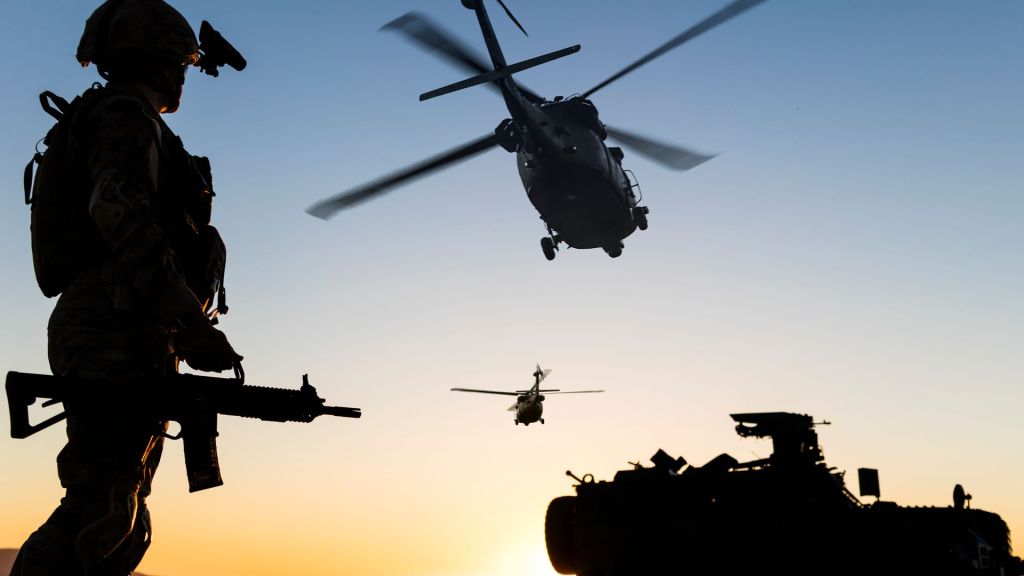
Commentary
-
Our commentary partners will help you reach your own conclusions on complex topics.
Hey everybody, Peter Zion here coming to you from Harris saddle on New Zealand’s fame mystery burn track looks silly today. No stupid helicopters. Anyway, we’re going to talk about Japan, while I’m out here, the g7 is getting ready for their annual summit. And of course, the topic of the moment is Ukraine, Ukraine, Ukraine, Ukraine, and the Japanese have decided to belly up the bar with a significant amount of cash to support the polls who are in turn supporting the Ukrainians. Now, historically speaking, unless you’re talking about pure humanitarian relief for things like hunger, the Japanese have really had a really small footprint international relations, it has to do with geography. So it’s a series of volcanic islands that have little enclaves where people can live. So relatively weak infrastructure linking the sections, historically speaking, it’s really only in the modern age that that’s changed. But what that does mean is that the Japanese have always had to have a significant Navy, which means they’ve always been technologically advanced. And when that is kind of how you knit your homeland together, you can imagine how advanced you feel when you go out into you interact with countries that don’t have the infrastructure and don’t have the Navy and don’t have the technology. So the Japanese have always had a bit of a superiority complex. And that led them to basically colonize and conquer a number of countries, including China and Korea and Taiwan over the ages, and led them in World War Two to try to knock the US out of the war by destroying the fleet of Pearl Harbor. Now, obviously, history went a different direction. And the United States showed that even when it was fighting a land battle in Europe, that it was still able to float and sail a superior Navy to the Japanese, both in terms of technical acumen and tonnage. And so the Japanese were crushed in the war. And then of course, that was punctuated with the two atomic blast and Nagasaki and Hiroshima. Now, with that kind of in the back of your mind, you have to look forward, the Japanese know, in their bones, as much as they know anything that they will never be superior to the United States in terms of economic strength, naval power, and even now technology, their first world power, that is no joke. It’s the second most powerful navy in the world. I’m not trying to talk them down. But they realize that there’s a limit that they can’t go past number two, as long as the United States is in the game. And through the 50s and the 60s and 70s. In the 80s you had the strain of nationalism in Japan, that would talk about trying for it anyway, doing another chunk of World War Two former Tokyo Mayor Ishihara, I hope I got that name right. Apologies if I didn’t, can’t fact check out here advocated breaking the alliance and going its own way. Now, this was never viable. China is a naval power and its economy is based on the import of raw materials, especially energy and the export of finished goods. Sounds a little bit like China does it. And the United States was the power that was capable of patrolling the sea lanes and keeping safe keeping commerce safe for the Japanese. But by the time we got to the 90s, a couple things have changed. Number one, Japan entered into a protracted financial crisis that I would argue they will never recover from in kind of a weaker version, less intense version of the way that the Chinese do it. They’d print currency that issue loans to everyone that confiscate the savings of their population in order to make sure that there were sufficiently investment in jobs so that no one would rebel. They didn’t do this to the same just ridiculous stage that the Chinese have done. But it did build up trillions of dollars of equivalent of bad debt. And they have been trying to get under out from under that since the 1990s. So really, since things broke back in 1989, roughly, the Japanese economy has barely grown at all. In fact, I think it’s today less than 10%, larger than it was 30 years ago. I think maybe 93 was the last year they had any meaningful growth. So they know that the United States is on a continued growth spurt. It’s not rapid by first world standards. But it’s faster than anything of Japanese can manage so that the delta between the Americans and the Japanese keeps widening. The second big thing is demographics. Because of that oncologic geography. This is a very urbanized country, pretty much everybody lives in high rises. And in high rises, it’s hard to tell the kids to go play in the yard, so you just don’t have them. And so Japan has had one of the world’s lowest birth rates, not just for years, but for decades. And by the time they got into the 1990s, it was pushing towards retirement that even the nationalists in Japan are realized that the dream was really dead. And so throughout the 90s, and the 2000 and the 2010s, you had this increasing pragmatism in Japanese foreign policy, versus the United States versus Taiwan versus China versus Korea, where a lot of the more iconic class positions kind of faded away and the positions where the Japanese would try to be neutral because they didn’t want to repeat of World War Two are really how it ended. Kind of turn into bit by bit a little bit more proactivity and this culminated underdog Will Trump have all presidents when the Japanese came calling looking for a trade deal, and in the end, knowing that the United States was the demographic and the military superpower, they decided that they needed to seek a permanent alliance with the United States under Donald Trump figuring if they could do it with Trump, they could do it with anyone. And they prove that they could. And they cite a humiliating trade deal with Washington, which is enforced today. And unlike a lot of the other countries, I’m thinking here, Korea, Mexico, Canada, who signed trade deals with the Trump administration. And then in the first month of the Biden administration tried to back away from some of the more crushing details, the Japanese made it very clear that they were fine as it is, meaning that the Japanese are the only country that really sees where all of this is going with China, and broader conflict in the world, especially in terms of Commerce, in terms of demographics, and in terms of realizing that if you can’t get along with all stripes of Americans, you risk being left on the outside. So for the Japanese to step forward and say they’re going to be taking direct economic activity to directly buttress the European effort in Ukraine, Ukraine itself, that’s a big deal, because they are slightly out of region. And if this had happened just 10 years ago, the Japanese would be trying to find a middle ground that what would not offend anyone, but In for a penny in for a pound and the Japanese are in for a time. Okay, that’s it for me. Until the next video.
-
Hurricane Helene hits US coast, Appalachia and beyond
Hurricane Helene hit Florida and Georgia overnight between Sept. 26 and 27 as a Category 4 hurricane, and accompanying storms will continue reaching deeper into the continental United States today. Dangerous flash flooding from the hurricane, known as storm surge, was some of the worst flooding that the Tampa Bay area has ever seen, and… -
Israel holds upper hand against Lebanon, Hezbollah and Iran
On Wednesday, Sept. 25, Hezbollah launched a ballistic missile at Tel Aviv in retaliation for Israel’s explosive pager attack that blew up devices across Lebanon. Although Israel’s defense systems intercepted the surface-to-surface missile, the attempted strike on Tel Aviv marked a significant escalation by Hezbollah. Since the siege on Gaza began, shortly after the Oct. 7, 2023,… -
The Sinaloa Cartel civil war
Fears of a civil war within the Sinaloa Cartel are growing as violence between competing factions within the cartel continues. The Mexican Army has dispatched around 600 elite troops to Sinaloa to help quell those fears, in addition to roughly 2,200 regular soldiers and National Guard. Watch the above video as Straight Arrow News contributor… -
New Ukrainian weapons hit Russia where it hurts
Ukrainian drones struck a major Russian ammunition depot, triggering a massive explosion that was captured on camera. According to the Ukrainian military, 2,000 tons of munitions had arrived at the depot before the attack. Over the past two years, Ukraine has significantly increased its domestic drone production, allowing it to scale up attacks on military… -
Weighing social costs vs. economic benefits on immigration
Global human migration is one of the defining elements of our current historical era, according to the United Nations. Migrants face both the incentives to leave — forced out by climate change, crime and corruption, extreme poverty or violence — and incentives for where to go, based on available job opportunities and so on. Migration…
Latest Stories
-
 Getty Images
Getty Images
Trump admin. asks federal workers to detail weekly accomplishments, again
-
 Getty Images
Getty Images
Military members with gender dysphoria to be processed for separation: DOD
-
 Getty Images
Getty Images
Zelenskyy says Trump not owed an apology after White House dustup
-
 Getty Images
Getty Images
NCAA Tournament: Which men’s teams are on ‘bubble watch’?
-
 Getty Images
Getty Images
NFL scouting combine: How much faster can these players run?
Popular Opinions
-
In addition to the facts, we believe it’s vital to hear perspectives from all sides of the political spectrum.
Latest Opinions
In addition to the facts, we believe it’s vital to hear perspectives from all sides of the political spectrum. We hope these different voices will help you reach your own conclusions.
The opinions published in this section are solely those of the contributors and do not reflect the views of Straight Arrow News.





















Latest Commentary
We know it is important to hear from a diverse range of observers on the complex topics we face and believe our commentary partners will help you reach your own conclusions.
The commentaries published in this section are solely those of the contributors and do not reflect the views of Straight Arrow News.
Dr. Frank Luntz
Pollster and Political Analyst‘Biased’: What Americans think of ‘mainstream media’
‘Getting rid of them’: Americans discuss Trump and immigration
‘Woke’: Why some Biden 2020 voters backed Trump in 2024